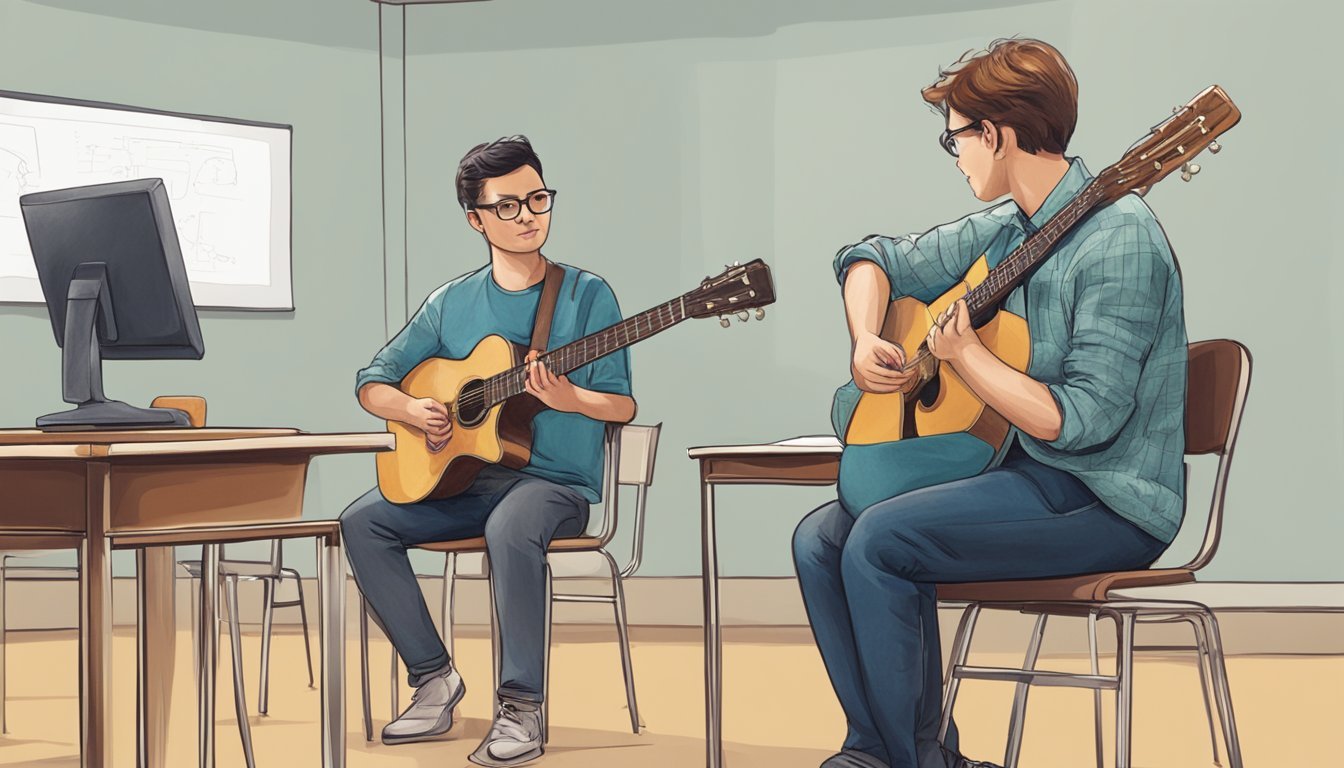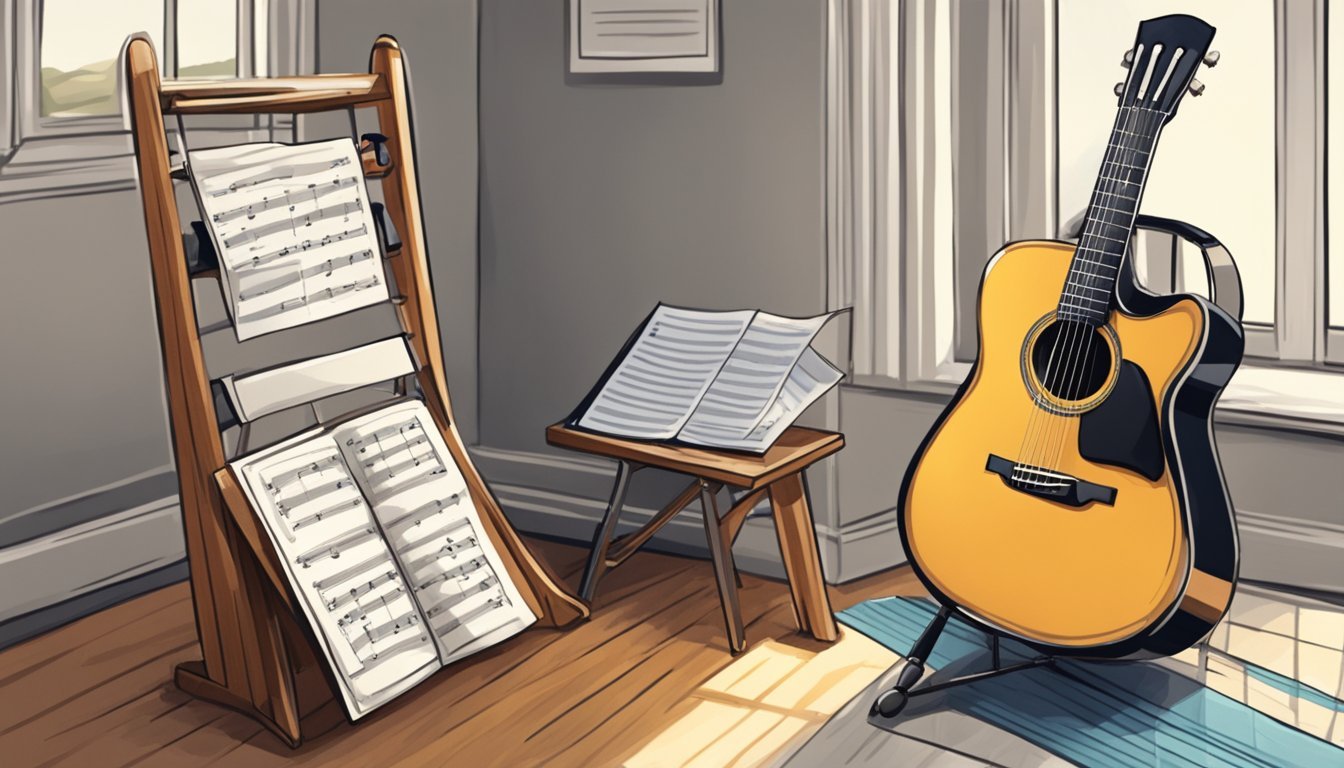Thinking about picking up the guitar? You’re not alone.
Many people want to learn how to play, and guitar lessons are a great way to start. The cost of guitar lessons typically ranges from $25 to $100 per session.
This depends on factors like location, lesson format, and instructor experience.

Whether you prefer in-person lessons or online classes, there are options to fit your needs.
Online lessons can be more affordable, costing around $15 to $50 per half-hour.
You might also consider group lessons for a lower price while still getting valuable instruction in music theory and playing techniques.
Finding the right instructor is key to your learning journey.
A good teacher will not only guide you in mastering the guitar but also help you understand music theory and develop your personal style.
With the right approach, you’ll be strumming your favorite songs in no time.
Key Takeaways
- Guitar lesson costs vary based on format and instructor.
- Online lessons are often more affordable than in-person sessions.
- Choosing the right teacher is essential for your progress.
Exploring Guitar Lesson Options

There are several ways to take guitar lessons, each with its own benefits.
You can choose between online and in-person lessons, or consider classes that fit within your schedule and budget.
Here’s a closer look at your options.
Online Versus In-Person
Online guitar lessons are a great choice if you prefer the comfort of your home.
They often cost less than in-person lessons, with prices around $25 to $50 for a half-hour session.
Many platforms offer a free trial lesson so you can test the waters.
In-person lessons, on the other hand, allow for hands-on teaching.
Prices usually range from $40 to $100 per hour.
It’s easier to get real-time feedback during live sessions, and some people enjoy the social aspect of meeting with a teacher face-to-face.
Group Classes Vs. Private Sessions
Group classes can be more affordable and offer a supportive environment.
These lessons usually cost about $25 for a half-hour session and allow you to learn alongside others.
It’s a perfect setup for beginners who want to experience learning with peers.
Private sessions provide a more customized approach.
You’ll receive individual attention, and the teacher can tailor lessons to fit your skill level.
While private lessons might be pricier at around $40 to $100 per hour, they can be more beneficial if you have specific goals in mind.
Subscription Services and One-Time Payments
Subscription services are becoming popular for guitar lessons.
You pay a monthly fee and gain access to a variety of courses and materials.
This option tends to be budget-friendly and allows you to learn at your own pace.
On the flip side, you can opt for one-time payments for individual lessons.
For example, Guitar Center offers packages where you can pay $219 for four 60-minute lessons.
This format might work well for those who prefer structure without committing to a longer-term plan.
Cost Breakdown of Guitar Lessons

When looking into guitar lessons, it’s important to know what to expect in terms of pricing.
Different formats, such as private or group lessons, come with varying costs.
You should also keep in mind additional expenses that might arise during your musical education journey.
Average Rates for Private Lessons
Private guitar lessons tend to be the most expensive option.
You can expect to pay between $40 to $100 per hour.
Prices often vary based on the teacher’s experience, your location, and the lesson length.
For example:
- Beginner Teacher: $40 per hour
- Intermediate Teacher: $60 per hour
- Experienced Teacher: $80 to $100 per hour
In some areas, you might find lessons costing about $1 per minute, making a 30-minute session around $30.
Always check local rates since the cost of living can significantly affect these prices.
Group Lesson Pricing
Group lessons are generally more affordable compared to private sessions.
You can expect to pay around $25 to $35 per lesson.
These classes are a great way to learn while meeting new people interested in music.
Group lessons usually last about 60 minutes and allow you to learn together with others at a similar skill level.
They can be fun and engaging, often making the learning experience less intimidating.
If you want to save money, group classes can be an excellent choice for beginners or those looking to learn basic skills at a lower cost.
Additional Costs to Consider
Aside from the lesson fees, there are additional costs to think about.
For example, you might need to buy your own guitar, which can range from $100 to several thousand dollars, depending on quality.
Other expenses include:
- Books and Materials: $20 to $50
- Online Access: $15 to $50 per month for memberships
- Equipment: Picks, amplifiers, or tuners can add up
Be sure to factor in these costs when budgeting for your guitar lessons.
It’s not just about the lessons but the overall investment in your musical education.
The Guitar Curriculum

When learning guitar, a solid curriculum will help you build a strong foundation.
It covers important areas that enhance your playing and understanding of music.
You will reach your goals by focusing on fundamentals, music theory, and a clear path to mastering the instrument.
Fundamentals and Techniques
To start, grasping the fundamentals is key to your success.
You’ll learn basic chords and scales, which are the building blocks of playing.
Different techniques like fingerpicking and strumming patterns will also be introduced.
Practicing scales like the major and minor will help you get familiar with the fretboard.
Also, focusing on chord transitions will make your playing smoother.
Aim for daily practice sessions, ideally 30 minutes to an hour, to reinforce these skills.
This solid foundation is crucial for progressing as a guitarist.
In addition to scales and chord transitions, it can be helpful to incorporate techniques like visualizing the chord shapes and using mnemonic devices.
For those struggling with memorization, here are some tips for memorizing guitar chords: try breaking down complex chords into smaller, manageable parts and practice them individually.
Consistent practice and repetition will not only enhance your familiarity but also boost your overall confidence as you play.
Music Theory Essentials
Understanding music theory is vital for any guitarist.
Learning about keys and time signatures will make playing with others much easier.
You’ll also explore chord progressions and how they fit into songs.
Studying music theory helps you communicate with other musicians and understand why certain notes sound good together.
Think of it as the language of music.
Incorporating theory into your lessons can enhance your creativity and allow for more improvisation.
This knowledge prepares you for playing various genres, from rock to jazz.
Progression and Mastery
As you progress, setting clear goals becomes important.
Begin mastering more complex chords and scales.
Focus on learning songs that challenge your skills, which keeps your practice engaging.
Over time, you should aim to play pieces that incorporate techniques you’ve learned.
Connecting the dots between your knowledge and real-world music will motivate you.
You might also want to explore advanced techniques, like soloing or fingerstyle playing, to expand your repertoire.
Emphasizing gradual growth will foster your love for guitar playing.
Choosing the Right Guitar Instructor
Finding the right guitar instructor is key to your learning journey.
You want someone who matches your style and can help you improve.
Two important factors to consider are their experience and teaching style, along with feedback from other students.
Experience and Teaching Style
When searching for a guitar teacher, check their experience.
A seasoned instructor often has a deeper understanding of musical education.
They can guide you better through private lessons.
Look for a teacher with a teaching style that works for you.
Some might focus heavily on technique, while others emphasize creativity.
Ask potential instructors about their methods.
You might also want to consider their background.
Have they performed live? Do they have formal training? This information can give you insight into how they teach.
Student Feedback and Success Stories
Student feedback is crucial when choosing an instructor.
Look for reviews or testimonials.
These can provide clues about how effective the teacher is.
Ask around for success stories.
Find out how past students have progressed under their guidance.
Do they feel confident playing now?
You might also check online platforms.
Some websites have ratings and reviews for guitar teachers.
A teacher with a lot of positive feedback usually indicates a good choice.
Frequently Asked Questions
It’s common to have questions about the costs of guitar lessons.
Here, you’ll find specific answers that can help you navigate your options and budget for learning the guitar.
What’s the going rate for beginner guitar lessons?
For beginner guitar lessons, you can expect to pay around $25 to $40 for a 30-minute session.
Prices may change based on where you live and the experience of the teacher.
Do prices for guitar lessons vary for kids and adults?
Yes, prices can differ between kids and adults.
Adult lessons might cost more, especially if they are private.
However, some instructors have special rates for kids to make learning affordable.
What’s a ballpark cost for guitar lessons at major music schools?
At major music schools, lessons often range from $40 to $100 per hour.
High-quality instruction comes at a cost, but these schools usually have experienced teachers and structured programs.
How much should I expect to pay for guitar lessons at local shops?
Local music shops typically charge between $20 and $50 per lesson.
Group lessons can be cheaper, ranging from $10 to $30, depending on the shop’s pricing.
Is learning to play the guitar gonna cost me a lot?
Learning guitar can fit into different budgets.
While private lessons may be pricier, online classes and group lessons can offer more affordable options.
What’s the hourly charge for private guitar instruction?
The hourly charge for private guitar instruction usually falls between $40 and $100.
Costs vary based on the teacher’s experience and your location.

